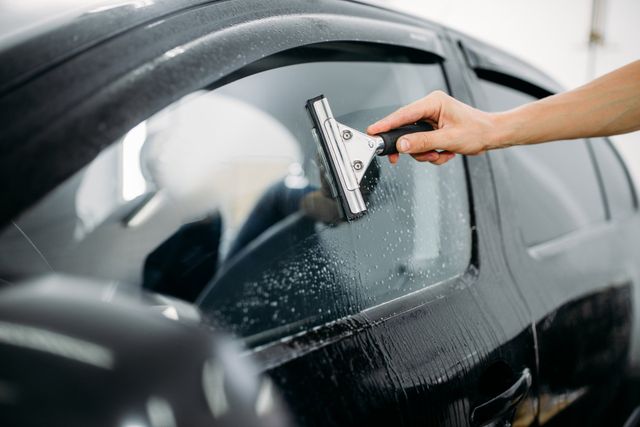The Advantages of Moro Auto Spa Window Tinting for Cooler Interiors
Your Comprehensive Guide to Do It Yourself Home Window Tinting: Idea
Taking on a Do it yourself home window tinting project presents an opportunity to improve both the functionality and visual appeals of your area. Prior to getting started on this venture, it is important to navigate the complexities of local tinting regulations and pick an ideal movie that straightens with your purposes.
Understanding Window Tinting Laws
Navigating the detailed landscape of home window tinting laws is essential for any do it yourself lover seeking to boost their automobile's looks and convenience. Each state in the united state has particular guidelines relating to the allowed levels of tint on various home windows, which can substantially impact your decision-making process.
Typically, these laws determine the optimum allowable Visible Light Transmission (VLT) percent, which describes the amount of light that can travel through the colored home windows. Some states permit only a particular percentage of color on the front windscreen, while allowing darker tones on rear home windows. Conformity with these regulations is vital, as failing to adhere can result in fines or the requirement to get rid of the tint entirely.
Furthermore, there are typically differences between passenger vehicles and business cars, with various rules putting on each classification. It's suggested to consult your local Division of Motor Cars or comparable authority to gather specific information customized to your area. Comprehending these regulations not just ensures lawful compliance but also improves safety and security by maintaining exposure and avoiding potential dangers while driving.
Picking the Right Color Film
Selecting the suitable tint film is an essential action in the do it yourself home window tinting procedure, as it directly affects both the look and functionality of your car's windows. A number of aspects need to guide your selection, including the sort of movie, its lawful compliance, and your wanted results.
First, consider the various types of color movies offered: colored, metalized, ceramic, and hybrid. Dyed movies offer a standard degree of personal privacy and warm reduction however might fade in time. Metalized movies offer improved heat being rejected and durability however can disrupt electronic signals. Ceramic films, while extra pricey, offer remarkable warmth resistance and UV defense without signal interruption.
Next, make sure that the movie sticks to neighborhood guidelines worrying visible light transmission (VLT) percentages. Conformity with these laws is important to avoid penalties and guarantee security.
Vital Devices for DIY Tinting
Having chosen the appropriate tint movie for your windows, the next action entails collecting the needed tools to guarantee an effective installation. The primary devices you will certainly need consist of an utility knife or a razor blade, which is important for reducing the tint movie to the wanted size. A squeegee is additionally crucial, as it helps remove air bubbles and ravel the movie throughout application.

Furthermore, take into consideration using a warm weapon or hairdryer, as this can aid mold and mildew the color film to the contours of the home window and promote adherence. Ultimately, gloves are advisable to avoid fingerprints on the film throughout installment. By gathering these necessary tools, you will certainly be well-prepared to tackle your do it yourself home window tinting job effectively.
Step-by-Step Application Refine
Begin by thoroughly cleansing the home window surface to make certain ideal attachment of the tint film. Make use of a glass cleaner and a lint-free cloth to remove any type of dirt, dust, or oil. As soon as the home window is tidy, measure the tint film against the home window, permitting a slight overlap on all sides. Cut the movie appropriately with a sharp pop over to these guys utility blade for a precise fit.
Lightly spray the home window surface area and the glue side of the film. Meticulously straighten the movie with the top of the window, ensuring it is straight. Use a squeegee to smooth the movie, applying company, also stress.
Trim any excess movie from the edges with your utility blade. Finally, enable the color to treat for at the very least 24 hours without rolling down the home windows. This step is crucial for guaranteeing a lasting application. Follow these steps vigilantly for ideal results in your do it yourself window tinting project.
Upkeep and Care Tips

It's advisable to wait a minimum of a week after installment before cleaning your home windows to permit the sticky to totally heal. During this preliminary duration, prevent rolling down the home windows to stop any damage to the color.
Normal maintenance includes view it checking the edges of the color for any kind of indications of bubbling or lifting. If you observe any kind of issues, it's best to resolve them immediately to stay clear of additional degeneration. In addition, be careful with the use of window therapies, such as tones or curtains, as they can produce warmth that might endanger the tint with time.
Conclusion
To conclude, undertaking a DIY home window tinting project requires cautious factor to consider of local guidelines, choice of proper color films, and the usage of vital tools. An organized application procedure guarantees ideal outcomes, while routine upkeep contributes to the durability of the color - Moro Auto Spa Window Tinting. By sticking to these standards, people can achieve both visual improvement and enhanced personal privacy in their rooms, making DIY home window tinting a valuable undertaking